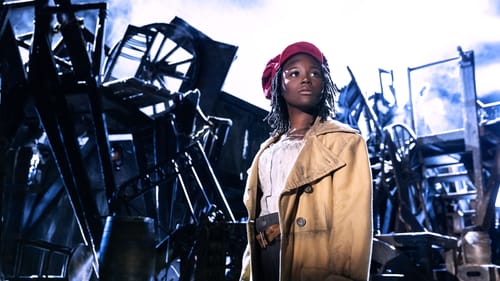Stay in the Loop
BSR publishes on a weekly schedule, with an email newsletter every Wednesday and Thursday morning. There’s no paywall, and subscribing is always free.
Singing the desire for a better world
I loved Les Misérables as a teenager. Now it’s back in Philly, and I want to rediscover it.

In my eighth-grade English class in 1985, Ms. Emeigh handed each of us a thick book, the first of four novels we’d read, discuss, and write about throughout the year. The book was a classic, she explained, by a French writer named Victor Hugo: Les Misérables. My classmates uttered a collective groan at the weight of the book. I felt a quiet thrill as I scanned the back cover; by that point in junior high, I knew to keep my enthusiasm at bay.
What would you do, Ms. Emeigh asked, if you were starving and had nothing to eat? Would you steal a single loaf of bread if that was the only way to feed your family?
She invited us to discuss this idea further at Brown Bag It with Books, a weekly lunchtime gathering in her classroom. The majority of kids who showed up came to escape cafeteria chaos: the food fights, the fist fights. I dreaded the very end of the lunch period most: when the assistant principal called up students who were in trouble to form a line “to get whacked.” At that time, public corporal punishment was the norm in our central Pennsylvania school.
Worlds within worlds
Ms. Emeigh was a teacher who opened worlds inside of worlds; a classroom could become a haven. By giving me Les Misérables, she offered me an escape to the world of early 19th-century France. I spent hours immersed in the struggle of Jean Valjean, the man who stole that bread, and of desperate Fantine, a mother who lost her child and then her life. I imagined lovesick Eponine and her scheming innkeeper father and the merciful bishop who upon Valjean’s release from 19 years of doing hard labor gave him another chance.
If given a choice, I would have stayed in Ms. Emeigh’s room all day, discussing any book long after I’d finished my peanut butter sandwich and carrot sticks.
The life of a theater kid
Two years later, in 1987, Les Misérables became a hot show, opening on Broadway after its European debut. That was the year my older sister graduated high school and left for college in Philadelphia. I was in 10th grade and spent most of my free time acting in community theater.
In the fall of 1988, my parents, younger brother, and I planned to visit my sister at UPenn. A touring production of Les Misérables was coming to Philadelphia and my mom—a musical theater lover—got us Friday night tickets to see it. I don’t know which of us was more excited. But we quickly faced a dilemma: I had gotten a lead in a production of The Importance of Being Earnest and the director had a tantrum worthy of Waiting for Guffman when I told him I’d have to miss our Friday night rehearsal for my family’s trip.
My thoughtful mom came to the rescue. She decided I was old enough to stay behind on Friday, take the train by myself to Philly, and join the family. And she bought me a ticket to the Saturday night show.
A sacred adventure
It’s hard to capture the level of adventure this experience held for me. I had never been on an Amtrak train before and spent hours looking out the window and dreaming. When I arrived in Philadelphia, I took a cab from 30th Street Station to the hotel where my parents and brother were staying. They raved about Les Mis. We ate dinner with my sister and then my dad walked me to the show.
I had never sat in a theater by myself, next to strangers. I liked it. The curtains opened and there were the real live actors, bringing the characters from the page to three-dimensional life. I had memorized the entire score, listening to it over and over again on a cassette tape that got tangled in my Walkman. Watching the first scene, when the bishop forgives Valjean, my tears began. I cried through the entire show, even when I was laughing through the innkeeper’s raucous “Master of the House.”
Theater can be a sanctuary. A play can be a sacred experience. I felt it that night, the magic of experiencing Hugo’s words come to life.

I walked outside, wondering how to find a cab to go back to the hotel. I sang to myself from “On My Own”: “Remember, the truth that once was spoken / To love another person is to see the face of God…”
Everyone who has loved and grieved
At Emerson College, where I studied theater and creative writing, my friends were all the kids who were happy when the English teacher gave out thick books, who found comfort in community theater.
One of my closest friends loved Les Mis with equal or more vigor than I did. We would walk through the Boston Commons taking turns dramatically singing the “Confrontation” scene between Valjean and policeman Javert: “Valjean, at last, we see each other plain … Monsieur le Mayor, you’ll wear a different chain!”
When I learned that Les Mis would be returning to Philly (landing at the Academy of Music from August 27 to September 8, 2024) and that I could see it again after all these years, my first instinct was to call my friend, but I don’t have any way to contact him now. He is a lost friend for reasons that I would never have been able to fathom on those cold winter afternoons when we sang our way home.
My friend and I shared a desire for the world to be better than it is: different, just, equitable. We didn’t have words then to express that desire, but we sang it every day in the Les Mis score. I didn’t know then that the heartbreak of Hugo’s characters is the heartbreak of anyone who has loved and grieved, that heartbreak I feel now thinking of my lost friend.

A risky rendezvous?
It is a risky thing, to return to a work of art that you love so deeply, a play that has played such a significant role in your coming-of-age, one that held so much of your longing. A work of art that was one of your closest companions.
My goal is to watch the production of Les Mis coming to Philadelphia this week with as much of a beginner’s mind as possible. To view it with fresh eyes, new perspective. Over the last 35 years, I’ve realized that our society is not closer to figuring out a way for every person to be fed, for justice to be meted out with compassion and a desire for repair.
As I started to write this essay, I couldn’t wait any longer. I put on the soundtrack from the original Broadway production, streaming it from my laptop. Even before the overture was finished, I felt my tears. I started to sing.
What, When, Where
Les Misérables. By Claude-Michel Schönberg, Herbert Kretzmer, Alain Boublil and Jean-Marc Natel; directed by Laurence Connor and James Powell. August 27 to September 8, 2024, at the Academy of Music, 240 S Broad Street, Philadelphia. (215) 893-1999 or ensembleartsphilly.org.
Accessibility
The Academy of Music is an ADA-compliant venue. Please contact Ensemble Arts directly to discuss specific details for navigating its historic buildings by calling Audience Services at (215) 893-1999 or reaching out by email.
Sign up for our newsletter
All of the week's new articles, all in one place. Sign up for the free weekly BSR newsletters, and don't miss a conversation.

 Gabrielle Kaplan-Mayer
Gabrielle Kaplan-Mayer